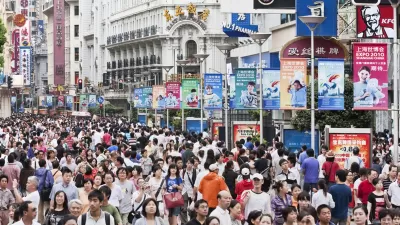While they look clean and green on the drawing board, Asia's planned developments might be nothing more than cloned commercialism set in concrete. By undermining local culture, this 'smart city' approach may also prove unsustainable.

Kris Hartley attacks a recent glut of massive Asian 'smart city' projects: pre-planned and well-branded development ostensibly suited to the global economy.
Like colonial architecture of the past, modern incarnations "frequently overlook the peculiarities of indigenous culture in favour of a commodified landscape designed to serve commercial interests. When thoughtfully considered, the term 'smart city' often proves to be a veil for standardised planning visions that are neither smart nor culturally attuned."
Though they are advertised as connected, sustainable, and clean, Hartley writes that many of these cities "appear to be little more than postmodern takes on Corbusian monumentalism, with broad highways bisecting districts of tower blocks. Furthermore, a critical element is missing: culture."
Design alone, and lip service paid to an aesthetic environmentalism, merely replicates harmful globalizations of the past. For planned cities to truly prosper, "In commercial terms, authenticity is a competitive advantage, providing experiences for citizens and visitors that are absent in universal, commodity-stock developments. Planners on both sides of urban collaborations should therefore be mindful of cultural dimensions, lest the smart city lose its local wisdom."
FULL STORY: Smart cities and the plight of cultural authenticity

Alabama: Trump Terminates Settlements for Black Communities Harmed By Raw Sewage
Trump deemed the landmark civil rights agreement “illegal DEI and environmental justice policy.”

Planetizen Federal Action Tracker
A weekly monitor of how Trump’s orders and actions are impacting planners and planning in America.

The 120 Year Old Tiny Home Villages That Sheltered San Francisco’s Earthquake Refugees
More than a century ago, San Francisco mobilized to house thousands of residents displaced by the 1906 earthquake. Could their strategy offer a model for the present?

LA’s Tree Emergency Goes Beyond Vandalism
After a vandal destroyed dozens of downtown LA trees, Mayor Karen Bass vowed to replace them. Days later, she slashed the city’s tree budget.

Sacramento Leads Nation With Bus-Mounted Bike Lane Enforcement Cameras
The city is the first to use its bus-mounted traffic enforcement system to cite drivers who park or drive in bike lanes.

Seattle Voters Approve Social Housing Referendum
Voters approved a corporate tax to fund the city’s housing authority despite an opposition campaign funded by Amazon and Microsoft.
Urban Design for Planners 1: Software Tools
This six-course series explores essential urban design concepts using open source software and equips planners with the tools they need to participate fully in the urban design process.
Planning for Universal Design
Learn the tools for implementing Universal Design in planning regulations.
Ada County Highway District
Clanton & Associates, Inc.
Jessamine County Fiscal Court
Institute for Housing and Urban Development Studies (IHS)
City of Grandview
Harvard GSD Executive Education
Toledo-Lucas County Plan Commissions
Salt Lake City
NYU Wagner Graduate School of Public Service





























